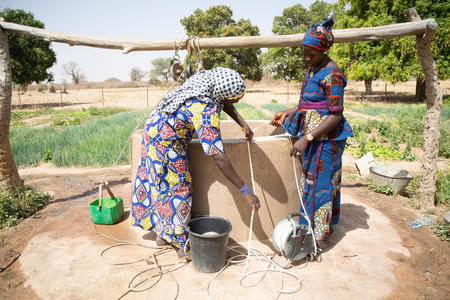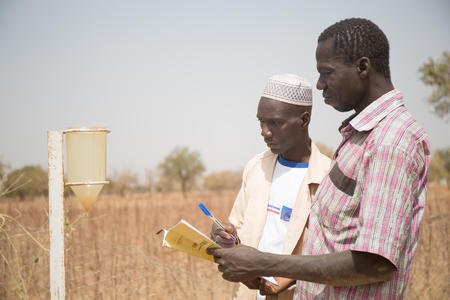Let’s end this era of broken promises on climate change and water, to enable the Sustainable Development Goals

Sustainable Development Goal 6 on water and SDG 13 on climate hold the delivery of the development agenda in the balance. How should we step up to integrate action on water, sanitation and hygiene and climate change adaptation and mitigation? Jonathan Farr, Senior Policy Analyst at WaterAid, introduces our new brief.
The history of government action on climate change is a story of broken promises. The alarm bells have been ringing for 30 years, since before Rio Summit; the Kyoto Protocol, which will be 20 years old in December, was followed by a rapid increase in emissions; developing nations are still waiting for the billions of dollars promised at the Copenhagen summit in 2009 and reaffirmed in 2015.
Lessons have been learned and the Sustainable Development Goals (SDGs) for 2030 have a built in stock-take to check progress. The annual meeting of the UN High Level Political Forum is an all-too-rare opportunity to hold governments – and ourselves in the development community – to account well in advance of 2030. We need to make sure we are taking the necessary actions and identifying barriers as we go.
We must use this opportunity for accountability
This process cannot come soon enough. Mami Mizutori, the UN Secretary-General’s Special Representative on Disaster Risk Reduction, said earlier this month that there is a climate disaster happening every week around the world. These crises – flooding, droughts, and severe storms – will have dramatic impacts in the short term, but the long-term problems will arise in household water supplies.
Droughts will see water resources under pressure, as we have seen recently in Chennai and in Cape Town last year, but also in many towns and villages in Africa and South Asia. To counteract this, WaterAid is working with communities living in poverty to boost monitoring and management of water resources, to empower communities to prepare for droughts and be resilient to climate impacts.
If we don't tackle climate change, development gains will roll back
All the 2030 Sustainable Development Goals to secure global prosperity are interlinked, but SDG 13 on climate and SDG 6 on water in particular hold the delivery of the SDGs in the balance. If we don’t tackle climate change, many of the development gains made over the past 20 years could be rolled back in the face of crisis after crisis, including an extra 700 million people facing water scarcity. If we don’t secure access to safely managed water supplies, communities will be held back by severe health impacts, children won’t be able to complete their education and cities will be unsustainable.
Examples of integration exist – they must become global programmes
Movement to integrate climate change adaptation and mitigation into development has been slow. But there are some positive examples. WaterAid is already working with communities in West Africa, Ethiopia and Bangladesh to secure water supplies and protect sanitation services from the effects of climate change. And Mercy Corps, in the Democratic Republic of Congo (DRC), is implementing a programme that seeks to improve people’s stability through improved land governance and access to land, and the development of a more efficient and inclusive market environment for more than 250,000 people in North Kivu. In line with SDG 13, the programme includes a strong natural resource component that focuses on the ways to address ecological conditions in North Kivu that contribute to food insecurity, increased conflict and social inequity.
This radical rethink will require alternative ways of working, and SDG 13 requires new partnerships to address the complexities of global problems – including climate change. One such model is the Zurich Flood Resilience Alliance, which looks at how to address the complex problem of flood resilience to identify and implement practical ways to help communities strengthen their resilience to flood risk. Through the Zurich Alliance programme, Mercy Corps and its Alliance partners are seeking innovative ways to increase funding for flood resilience and incorporate a resilience approach into national government plans. In Indonesia, Mercy Corps is looking at the potential of an impact bond to incentivise investment in flood resilience, and in Nepal working with 11 local governments to incorporate a market systems approach in disaster resilience policy and planning.
We need to see these examples become global programmes, yet only 28%, or $761 million, of total adaptation finance is allocated to fragile and conflict-affected states – and fragile countries receive just 12% of multilateral finance for climate adaptation and mitigation. Countries must wake up to the threats they face, starting this week at the High-Level Political Forum, if not already.
Urgent actions for a sustainable future
Countries must:
- Dramatically increase adaptation funding, especially to fragile and conflict-affected states.
- Increase funding for Disaster Risk Reduction (DRR) and climate adaptation measures that strengthen resilience to floods and other climate-related hazards. Critically, funding for building resilience needs to reach and strengthen local level structures where the impacts of disaster are most felt.
- Integrate DRR, climate adaptation and resilience building into development policies, strategies and practices to avoid losing SDG gains. By aligning laws and policies, countries and communities can build resilience in a more integrated way.
- Prioritise the most vulnerable and marginalised people for disaster risk management, climate adaptation and resilience-building investment and programming, to ensure that those most at risk benefit first.
- Include WASH in climate change policy as a key adaptation strategy. Governments must commit to and incentivise better cross-institutional cooperation, recognising that water, sanitation and hygiene are essential elements in climate change adaptation.
This is not just about putting a sticking plaster on problems, but building the future we want to see – a future based on reliable access to clean energy and clean water, where living standards are rising rather than hanging off a precipice, and where governments can proudly stand by their record on delivering promises.
Read our policy brief Climate change adaptation and resilience and water, sanitation and hygiene: links between SDG 13 and SDG 6
Follow our coverage of HLPF 2019 on our hub page, diary blog and Twitter.
Jonathan Farr is Senior Policy Analyst at WaterAid UK.





